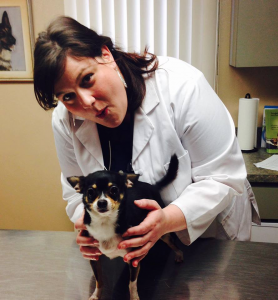
I was looking for a fight. The client knew it and was calling me out on it. I had been angry since the moment I dialed the phone.
“Hi, it’s Dr. Smith from the animal hospital. I hear there’s a problem with you picking up Fido’s script…” I started out pleasant enough on the surface but inside I was prepared for a battle.
The client was angry because I refused to mail them a prescription for their pet’s seizure medication. It was a controlled substance and two previous prescriptions had already been lost in the mail. The patient was completely out of medication.
I agreed to refill it but only if the client came down and physically picked up the hard copy of the script to deliver to the pharmacy. The client wasn’t satisfied when the receptionist told them this and demanded to speak to me.

I tried to explain the legal issues surrounding controlled substances, but the client was adamant that I was in the wrong.
“My dog needs her medication, if he has a seizure it will be your fault,” the client snapped.
“No, it will be your fault for refusing to drive down here to pick up the prescription.”
“I worked all day, I’m not going to spend 30 minutes sitting in traffic just to pick up a piece of paper.”
“And I’m not going to risk my DEA license. If you can’t get here today, you shouldn’t have waited until the last minute to request a refill. Poor planning on your part is not an emergency on my part,” I retorted angrily.
Things only went downhill from there. We bickered a little bit longer before the client sneered, “Well thaaaaaank you for alllll your help.”
“You’re welcome,” I replied haughtily before slamming down the phone.
A part of me found it satisfying to tell off a difficult client who had been nothing but rude, demanding and accusatory but the truth is, we had fed off each other’s negative energy and accomplished nothing. The client was angry, I was angry, the patient had no medication. My own behavior had only exacerbated an already tenuous situation.
This is known as complementarity–the idea that we mirror the behavior of the person we’re interacting with. Friendliness begets friendliness and hostility begets hostility. When we encounter difficult clients, it’s easy to get defensive and fall into the pattern of being difficult in return.
I don’t know if anything I could have said would have defused this particular situation—the client was adamant that I do what she wanted and I was adamant that I would not. We were at an impasse. But sometimes, all it takes is for one person to break the cycle and turn the situation on its head.
In another instance, I was dealing with an angry client who normally saw one of my colleagues. I had called her with lab results and she was upset because I had not reviewed the pet’s medical history far enough back to know that her dog had dealt with the same issue several years prior. When she came into the clinic for a follow up the next day, she asked someone who I was and approached.
“You know, you shouldn’t call people without reviewing the entire medical record,” she said angrily.
I opened my mouth prepared to defend myself—I was doing a favor by following up when her regular doctor was away and I had reviewed the recent records, I just didn’t have time to go back through dozens of pages and years of history just to deliver lab results. I was prepared to let the angry words flow. Instead, what came out was an apology.
“You’re right, I’m sorry.”
She paused, looking taken aback. “Alright then.” And that was the end of that.
I’ve had many other interactions as well where reacting to an irate client with kind words and a smile on my face, even when I wasn’t feeling it, changed the whole situation. Doing the unexpected can break the cycle and by acting kindly, you naturally encourage the client to do the same.
I’m not advocating for letting clients walk all over you, of course. If they continue to berate you, undermine you and harass you or your staff, you need to take a stand. You need to let them know that you will not be mistreated or they will have to find another vet. Life is too short to let people bully you. But often times, a little kindness can go a long way towards turning a difficult client into a great one.
The views and opinions expressed in this article are those of the author and do not necessarily reflect the position of the DrAndyRoark.com editorial team.
 About the Author
About the Author
Dr. Lauren Smith graduated in 2008 from Ross University School of Veterinary Medicine and completed her clinical year at Cornell University. Her professional interests include internal medicine, preventative medicine and client education. Dr. Smith lives and practices on Long Island with her cat, Charlie and dog, Frankie and loves to read write and run in her free time. You can check out more of her writing at laurensmithdvm.com